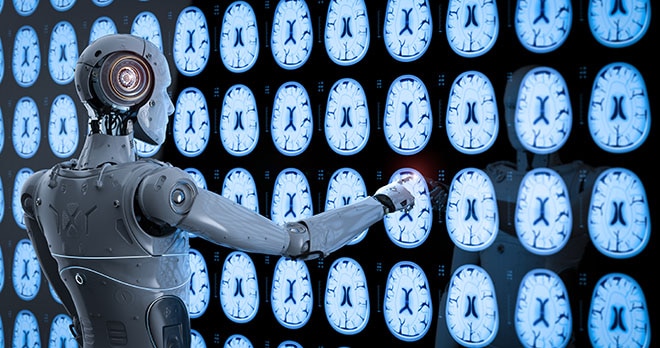Will the use of Artificial Intelligence (AI) replace doctors in London hospitals?

Recent developments show that both healthcare and AI firms have been quick to make use of opportunities for collaboration in the healthcare sector. Driving this collaboration are concerns around the current performance of the NHS, Accident & Emergency departments ability to meet demand and calls for responsive services across all areas of healthcare services.
So, what is AI being used for?
On 22nd May 2018 Satya Nadella (CEO of Microsoft) announced a partnership with Great Ormond Street Hospital (GOSH) to support the research and evaluation of AI in healthcare, with a focus on the provision of child healthcare services.
To start with, a Minecraft world was created as a scale replica of GOSH so that children are able to familiarise themselves with the hospital before admission. GOSH is also partnering with The Gruffalo to accommodate their augmented reality (AR) app, in the hope that this will provide a distraction from fear or discomfort. The ultimate aim of all of this is to improve patient experience.
AR is also being trialled to help doctors deduce the relative location of tumours within organs and indicate the potential complications of a treatment or the effects of delaying treatment. It is expected that this will improve treatment and patient prognosis.
A similar partnership between the University College London Hospital (UCLH) and The Turing Institute will result in AI being used to reduce Accident & Emergency department waiting times and ensure critical cases are treated sooner. AI will also be used to identify patterns from thousands of real-life scenarios.
The hope here is that AI will make it easier to identify patients presenting with symptoms that generally do not become serious. Patients that do not require further clinical input can therefore be managed appropriately. This could also enable patients to be fast tracked through for further assessment and treatment. Whilst it is recognised that the use of AI could make some clinician’s actions redundant, the aim is to complement rather than replace them.
Advantages of using AI
Support for the use of AI has also come from the Prime Minister with Theresa May hoping “data, artificial intelligence and innovation” will transform diagnosis of diseases such as cancer, diabetes and dementia by 2030.
There are a number of advantages to using AI in healthcare including:
- improving patient experience;
- providing care that is more effective and personalised; and
- improved analytics will allow data to be used more efficiently and will help in the accurate diagnosis of diseases and in predicting future complications.
Potential disadvantages of AI
However, as you might expect, there are a number of disadvantages to using AI in healthcare services including:
- the potential need for a universal basic income as jobs become increasingly automated;
- ‘rogue’ AI could become too difficult for scientists to understand; and
- the loss of jobs as clinicians are replaced or redundant.
The reality of AI in hospitals
The reality, for now, appears to be that AI will be used in a number of hospitals across London to aid clinicians in the diagnosis and treatment of patients. If AI can be an effective solution to the increasing demands on clinicians it can only be welcomed.
It is clear though that effective regulation of AI is going to be essential in order to protect patients and their personal data.
For now at least, however, it does not look like AI will be making clinicians redundant any time soon.